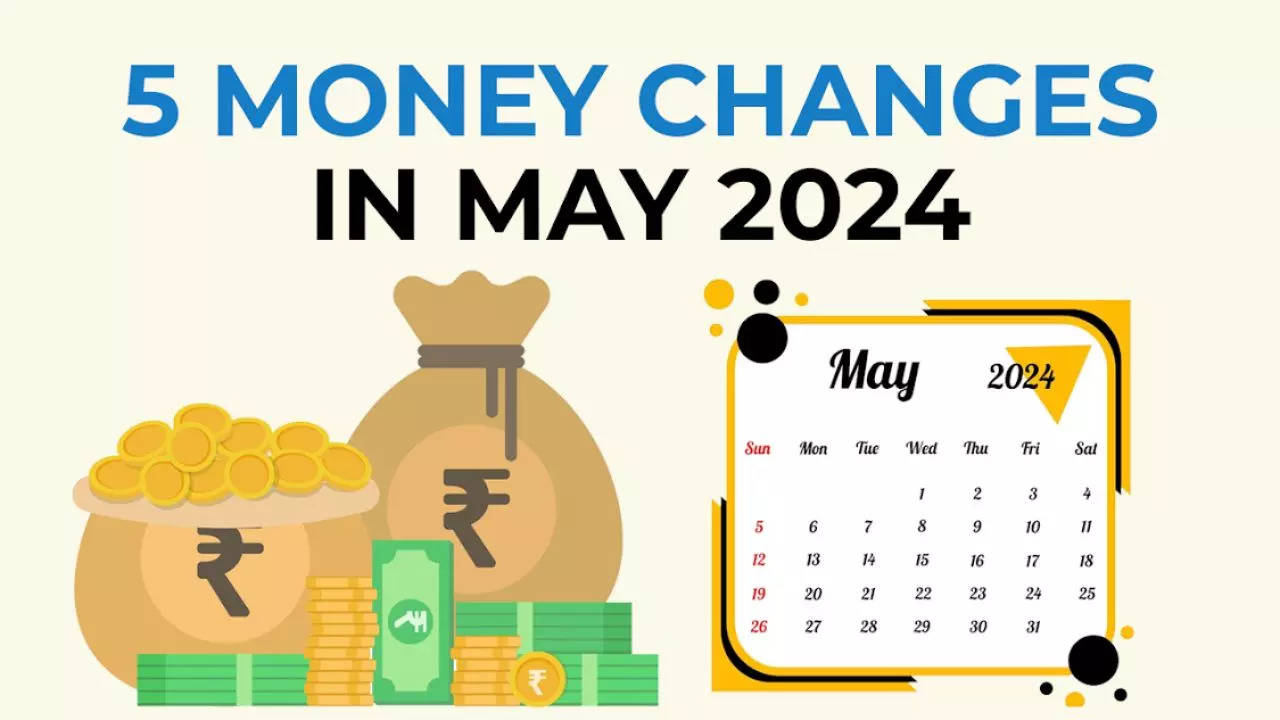[ad_1]
1.HDFC Bank senior citizen special FD deadline
HDFC Bank has extended the deadline for investing in its special fixed deposit (FD) scheme for senior citizens. This Senior Citizen Care FD, which offers higher interest rates for seniors, was launched in May 2020. The new deadline for investing in this scheme is May 10, 2024.
2. ICICI Bank savings account charges from May 1, 2024
ICICI Bank has updated its fees for several savings account services, including cheque books, IMPS (Immediate Payment Service) transactions, ECS/NACH (Electronic Clearing Service/National Automated Clearing House) debit returns, and stop payment charges. These new charges take effect from May 1, 2024, according to ICICI Bank’s website.
ALSO READ | GST collections hit all-time high; cross Rs 2 lakh crore in April 2024
Here are the changes in ICICI Bank’s savings account service charges starting from May 1, 2024:
Debit card annual fees:
– General fee: Rs. 200 per annum
– Gramin locations: Rs. 99 per annum
Cheque books:
– First 25 cheque leaves per year are free
– Additional leaves: Rs. 4 per cheque
DD/PO charges:
– Cancellation, duplicate, or revalidation: Rs. 100 per instance
IMPS outward fees:
– Transactions up to Rs. 1,000: Rs. 2.50 per transaction
– Transactions from Rs. 1,001 to Rs. 25,000: Rs. 5 per transaction
– Transactions from Rs. 25,001 to Rs. 5,00,000: Rs. 15 per transaction
Account closure: No charges
Debit card PIN regeneration: No charges
Debit card de-hotlisting: No charges
Balance certificate/Interest certificate: No charges
Retrieval of old transactional documents: No charges
Signature attestation: Rs. 100 per application/letter
ECS/NACH debit returns: Rs. 500 per instance for financial reasons (limited to 3 instances per month for the same mandate)
Stop payment charges:
– For a specific cheque: Rs. 100 (free via customer care IVR and online banking)
Address change requests at branches: No charges
3. Yes Bank Savings Account Charges from May 1, 2024
Yes Bank, a private sector bank, has updated its savings account fee schedule. The new charges will start on May 1, 2024, according to the bank’s website.
According to Yes Bank’s website, the average monthly balance requirements for savings accounts are as follows:
– Savings account PRO Max: Rs. 50,000, with a maximum penalty of Rs. 1,000 for non-compliance.
– Savings account Pro Plus / Yes Essence SA / Yes Respect SA: Rs. 25,000, with a maximum penalty of Rs. 750.
– Savings account PRO: Rs. 10,000, with a maximum penalty of Rs. 750.
– Savings Value / Kisan SA: Rs. 5,000, with a maximum penalty of Rs. 500.
– My First YES: Rs. 2,500, with a maximum penalty of Rs. 250.
Account service charges:
1. Full balance or more: No charge.
2. More than half the required balance: A charge of 5% on the amount you fall short.
3. Half the required balance or less: A charge of 10% on the shortfall (5% for Savings Value accounts).
According to Yes Bank, the minimum balance requirements and associated charges for different account types are as follows:
– In some locations, you need to maintain an average monthly balance (AMB) of Rs. 5000 for YES Grace, Rs. 2500 for YES Respect, and Rs. 2500 for YES Value.
– For Kisan Savings Accounts, you need to keep an average yearly balance (AYB) of Rs. 1000.
– If you don’t maintain the minimum balance in a YES Value account (where the AMB is Rs. 2500), the maximum charge is Rs. 125 per month.
– For Kisan Savings Accounts, the charge for not maintaining the AYB is Rs. 100 per year.
Charges for ATM cum Debit Cards for Yes Bank savings accounts:
– Element Debit Card: The annual fee is Rs. 299.
– Engage Debit Card: The annual fee is Rs. 399.
– Explore Debit Card: The annual fee is Rs. 599.
– Rupay Debit Card (only for Kisan accounts): The annual fee is Rs. 149.
When using other bank ATMs in India, here’s what Yes Bank charges:
– First 5 transactions per month: No charge.
– After the first 5 transactions, the charges are:
– Financial transactions (like cash withdrawals): Rs. 21 per transaction.
– Non-financial transactions (like balance checks): Rs. 10 per transaction.
ALSO READ | Save lakhs in interest cost? What RBI’s new rules for interest overcharging on loans mean for borrowers
4. Yes Bank Credit Card Rules from May 1, 2024
YES Bank has revised its credit card terms, except for the ‘private’ credit card. These changes only impact the fuel fee category on some credit cards and how spending is calculated for waiving annual and joining fees. There is also a new fee for utility bill payments.
Starting May 1, 2024, using a YES Bank credit card to pay utility bills (like gas and electricity) will cost more. According to the YES Bank website on March 29, 2024, “A charge of 1% will be applicable on all utility transactions in a statement cycle.” If you use your YES Bank credit card to pay more than Rs. 15,000 in utility bills in a single statement cycle, you will also be charged GST and a 1% tax. However, these extra charges do not apply when using the YES Bank Private Credit Card.
5. IDFC First Bank credit card rule change from May 1, 2024
IDFC First Bank has updated its credit card policies regarding utility bill payments. If you use an IDFC First Bank credit card to pay utility bills like gas, electricity, or internet, there is no surcharge if the total amount is Rs 20,000 or less in a single statement cycle.
However, if the total utility payments exceed Rs 20,000 in a statement cycle, a 1 percent surcharge plus 18 percent GST will apply. This extra charge does not affect all credit cards— the FIRST Private Credit Card, LIC Classic Credit Card, and LIC Select Credit Card are exempt from this surcharge. This means that with these specific credit cards, you won’t face additional fees for utility bill payments.
[ad_2]
Source link
For more information call us at 9891563359.
We are a group of best insurance advisors in Delhi. We are experts in LIC and have received number of awards.
If you are near Delhi or Rohini or Pitampura Contact Us Here




